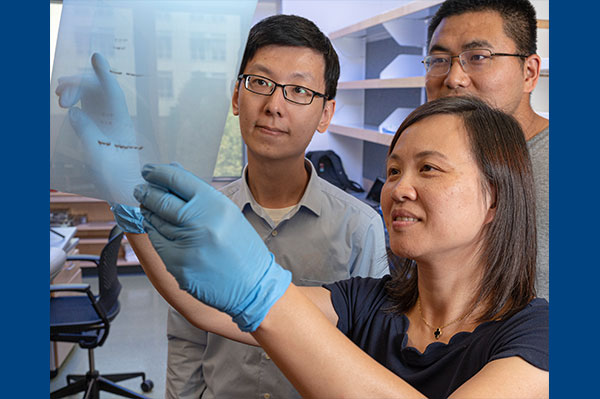In Pursuit of Personalized Treatment Strategies: Dr. Ling Cai

One of the newest members of Duke Pathology’s team, Ling Cai, PhD, is focused on developing innovative, therapeutic approaches for advanced prostate cancer.
Because most prostate cancers rely on hormones to reproduce and grow, first-line treatment called androgen suppression therapy, or ADT, often aim to reduce hormones. While ADT is often effective, it doesn’t work for everyone. Some cancers become resistant, leading to the condition castration-resistant prostate cancer, or CRPC for short.

As Cai and her team study CRPC for more effective treatments, they’re exploring how mechanisms of transcription factors and epigenetic regulators connect. To support their work, in 2021 Cai secured a five-year R01 grant titled “The Role of YY1 in Castration-Resistant Prostate Cancer.”
Through her team’s research, they have identified a unique function of the ARV7 transcription factor that is crucial for resistance mechanisms in advanced prostate cancer. They’re also identifying epigenetic regulators, which can be ‘drugged’ by small molecule inhibitors and tested in pre-clinical prostate cancer models.
Cai’s research team has numerous publications that not only contribute to the current understanding of advanced prostate cancer, but also set a promising trajectory for future breakthroughs in personalized and effective treatment strategies.
Cai is enthusiastic about advancing her research at Duke, expressing, “The department provides all kinds of support, and most exciting is having a very strong research program for prostate cancer."
Publications:
- Publication of her lab’s research titled “Cistrome Analysis of YY1 Uncovers a Regulatory Axis of YY1:BRD2/4-PFKP During Tumorigenesis of Advanced Prostate Cancer” in Nucleic Acids Research
- Publication of her lab’s research titled “A Cryptic Transactivation Domain of EZH2 Binds AR and AR’s Splice Variant, Promoting Oncogene Activation and Tumorous Transformation” in Nucleic Acids Research
- Publication of a Book Chapter titled “Epigenetic (De)regulation in Prostate Cancer” in the book “Epigenetics in Oncology”; Springer Publishing (in press).
- Publication of a review titled “Through the Lens of Phase Separation: Intrinsically Unstructured Protein and Chromatin Looping” in Nucleus.